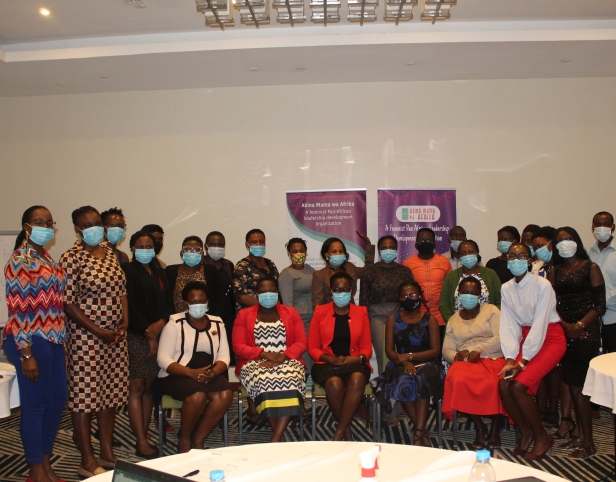
Akina Mama wa Afrika on 6th August, 2020, convened the first Technical Working Group (TWG) meeting on Gender under the Joint Advocacy for Sexual and Reproductive Health and Rights in Uganda (JAS) Programme. The purpose of the TWG meeting was to create a safe space for stakeholders to share information, strategize, coordinate efforts and develop collective action on gender issues under the SRHR space.
The group brought together 15 different partners within and outside the JAS consortium to collectively strategise on critical gender issues under the Sexual and Reproductive Health and Rights (SRHR) umbrella and build consensus on the Terms of Reference of the Technical Working Group. Five organizations outside the JAS programme immediately expressed interest in joining the Technical Working Group.
The group undertook an analysis of gender issues within SRHR in Uganda to ground the meeting, but the bulk of the discussion was focused on refining the Terms of Reference (TOR) for the Technical Working on Group and proposing possible joint activities to be undertaken.
Leah Eryenyu, AMwA’s Research, Advocacy and Movement Building Manager engaged participants in a conversation around the most pressing gender issues facing SRHR in Uganda and possible solutions that could change the situation. She also shared about maternal morbidity, comprehensive Sexual Education for the youth, restrictive access to safe abortion, and the disproportionate impact of HIV/AIDS on women and COVID-19 highlighting the importance of viewing SRHR advocacy through an intersectional lens starting with the issue of sexual orientation and gender identity and expression.
“Without an intersectional lens, LGBTQI+ persons are left without access to healthcare due to the disregard of their rights by policy makers and the general community. Sex workers are often unable to access SRHR services due to the violence and discrimination that they face from the state, police and clientele; putting them at risk of contracting HIV and other STDs,” Leah said, adding that this needed to be addressed urgently.
The participants noted lack of information, discrimination and rigid cultures as some of the most prevalent gender issues facing SRHR in Uganda; proposing comprehensive SRHR education and the development of more inclusive policies governing SRHR to solve the challenges. They also stressed the need for training and building the the capacities of health workers and the media to respond to issues of violence against women and appropriately report about issues of SRHR.
The meeting concluded with five organizations expressing interest in being part of the Technical Working Group and AMwA is currently in the process of formalizing membership for the Technical Working Group. Representatives from Freedom and Roam Uganda (FARUG), Golden Center for Women’s Rights Uganda (GCWR) and Alliance of Women Advocating for Change (AWAC), were amongst the organisations which expressed interest in joining the technical working group to represent the SRHR concerns of sex workers and women outside the cis-gender and heterosexual framework (trans, non-conforming and queer women).
The JAS programme is a multi-organization Sexual Reproductive Health Rights (SRHR) advocacy programme steered by the Centre for Health Human Rights and Development-CEHURD and supported by the Swedish International Development Cooperation Agency – SIDA. The programme aims at building a progressive social movement boldly challenging the deep structures affecting the realization of SRHR in Uganda.
AMwA is one of the organizations implementing the program with a focus on the thematic area of gender. AMwA’s objectives within the program is to contribute to building a movement that recognises and respects bodily autonomy and choice as the cornerstone of SRHR of women in all their diversities, influence policy and practice on SRHR at the national and regional levels as well as contribute to growth in thought leadership on SRHR from a feminist perspective.

